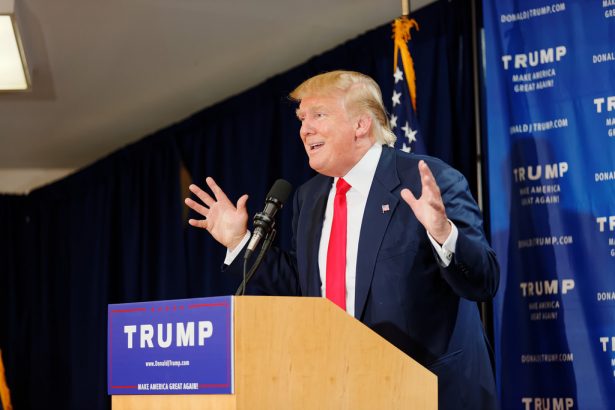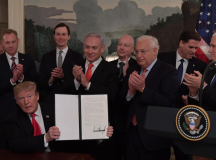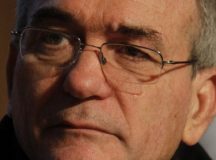American academic Khaled Elgindy is a non-resident fellow in the Center for Middle East Policy at the Brookings Institution. His new book, The Blind Spot – America and the Palestinians from Balfour to Trump tells the history of US-Palestinian relations as the evolution of a US ‘blind spot’, with regard to both Israeli power and Palestinian politics. If US eyes were opened by the First Intifada and the Oslo process and with successive US presidents supporting a two-state solution, Elgindy believes the Trump administration is now backing away from longstanding US policy. However, unless his peace plan is committed to 242, an end to the occupation and the creation of a Palestinian state, no Palestinian leader can engage with it. Download a PDF version here.
What is the US ‘Blind Spot’?
Samuel Nurding: You recently published The Blind Spot – America and the Palestinians from Balfour to Trump. What is the blind spot you refer to?
Khaled Elgindy: The Blind Spot in the book’s title refers to the tendency of US politicians to downplay or ignore two things critical to any diplomatic effort: Israeli power and Palestinian politics, which are two sides of the same coin.
For context, any negotiator understands that a successful outcome depends as much on the dynamics outside the negotiation room as those inside. Negotiations are not just about getting two leaders and their respective delegations together in a room to hammer out a deal. Rather, negotiations are also shaped, in terms of what each side can reasonably propose, by their respective public opinions, what their political opponents are doing and saying, and so on. Each side is negotiating their internal politics at the same time as they are negotiating with the other party at the table. It is also clear that the balance of power between the sides matters. The stronger party has more options and leverage than the weaker one.
An effective mediator has to take into account that both sides have internal political constraints and they must therefore create incentives and disincentives based on these power dynamics to encourage each side to act in support the peace process and avoid doing things that harm it.
But this is not at all what US mediation has done. It has a ‘blind spot’, namely its tendency to deal with the Israelis and Palestinians as if they were co-equal parties to a conflict, similar to Egypt and Israel in 1979, which were both sovereign states. In reality though, there has never been any parity between Israel and the Palestinians. One very powerful party dominates the other. This is not just a conflict between two sides, but also an occupation, and that occupation often gets filtered out in American thinking.
The flip side of this is the tendency to treat Palestinians as though their internal politics could be ignored, in complete contrast to the enormous sensitivity and deference with which US politicians and administrations approach Israeli internal politics. Bill Clinton, George W. Bush, Barack Obama and Donald Trump, have all been keenly aware of Israeli politics – what sort of mandate a particular Israeli leader has, the balance within the coalition he leads, the chance of early elections if a party within the coalition leaves due to pressure to curb settlements, and so on.
By contrast, US leaders have been virtually blind when it comes to internal Palestinian politics. For example, the Annapolis conference in the fall of 2007 took place following Hamas’ violent takeover of the Gaza Strip (and a year after Fatah lost elections), when Abbas was at his weakest. That this was the time the US felt was opportune to begin negotiations with the Palestinian leader, rather than any time in the two years prior when Abbas came to power and had been pressing hard to start negotiations with the Israelis, was telling. The notion that late 2007 was seen by the Bush administration as the optimal moment to start a negotiation process was a clarifying moment for me. It showed me that the US ignores Palestinian politics.
It does so partly because it has had a natural bias for nation states. It is easy for a superpower to lose sight of the importance or nuances of a non-state actor like the PLO. And there is the influence of the ‘special relationship’ between the US and Israel and the role in domestic politics of a very influential pro-Israel lobby that has been a constant in American politics for many decades. Ultimately, it’s just easier and less politically costly for administrations to put pressure on the Palestinians than on the Israelis. For the same reasons, it is easier to accommodate Israeli politics than Palestinian politics. We’ve often seen politicians who express sympathy for Palestinian perspectives targeted for criticism.
Kissinger and the rejection of non-state actors
SN: You write: ‘No American policymaker had a greater influence on shaping US policy toward the Palestinians as well as the Middle East peace process’ than Henry Kissinger. Why was he so influential and to what end?
KE: Kissinger was hugely powerful, first as President Nixon’s National Security Advisor and then as Secretary of State to Presidents Nixon and Ford. Even when Secretary of State Rogers put forward his own peace plan, Kissinger worked actively to undermine it. And as Nixon became bogged down in Watergate and his own problems, Kissinger assumed more powers and had pretty much carte blanche. Nixon was initially resistant to giving Kissinger a role in the Middle East in part because he didn’t think that the Jewish Kissinger would be fair-minded in dealing with the Israeli-Arab conflict.
Kissinger was a realist, a staunch Cold Warrior, and often quite Machiavellian in how he saw power dynamics. He believed that the driving force in international relations are nation states and at a time, during the 1970s, when there was an explosion, often literally, in non-state actors in terms of their role in global politics and global security. So Kissinger did not view the Palestinian issue as something legitimate or one that needed to be part of a peace process. At best he saw it as a distraction; at worse a dangerous influence. He perceived the PLO’s influence on Arab politics as extremely harmful and believed in order to make progress in the Israel-Arab peace process, the PLO would have to be weakened or marginalised.
The ultimate manifestation of this approach was the 1975 Memorandum of Agreement between Israel and the US, in which the US agreed not to talk to the PLO until the PLO met two conditions: 1) To accept UNSCR 242 (and the land for peace formula which had an implicit recognition of Israel in it); and 2) To recognise Israel’s right to exist. For many years these two conditions prohibited US contact with the PLO. It is interesting that there was no mention of terrorism as a condition for talks (that condition was added in the 1980s) even though the PLO had already engaged in pretty dramatic acts of terrorism, including the murder of US diplomats in Khartoum and the Munich Olympic killings. The fact terrorism wasn’t a factor in American or Israeli thinking suggests their decision was a political one – Israel wanted to keep the PLO out because they saw it as nationalist movement which laid claim to the same territory that the state was built on, and Kissinger had his reasons as well. That Memorandum became official US policy, and subsequently US law, and it was a real constraint on American Presidents in conducting diplomacy. Going forward, this became the original basis on which the US would essentially boycott the PLO until the 1980s.
Kissinger’s position on the PLO was not uniform in the US diplomatic community. There are always competing priorities and interests within and between the different components of the policy-making machinery – on any issue. Going back to the time of the Mandate, the State Department has tended to take the view that the US should not ignore the views of the Palestinians, both for its own merits but also because doing so would damage US credibility and standing in the Arab world and on the international community more broadly. And there were moments when clearly that was the case.
The First Intifada changes US perspectives
SN: Shultz was the first Secretary of State to authorise an official dialogue between the US and PLO, in 1988. Why did the US take so long to recognise the PLO?
KE: The 1987 Intifada not only put the Palestinian question on the regional and global agenda, but also drew attention to the PLO and its role as the central political address for the Palestinians. The PLO immediately capitalised on the Intifada by trying to co-opt it and support it with resources and political guidance. As a result of the Intifada, Jordan decided to sever its historical claim to the West Bank, and that was what really changed the US position – until then Jordan was seen as the primary address for dealing with the West Bank and the Palestinians in general.
The PLO had always been a player in the region, and US officials understood this. The US had always dealt with the PLO indirectly through various third parties-for example before, during, and after the Lebanon war. But now it became clear that the Americans had no alternative left other than to deal with the PLO directly. The irony is that as US officials came to the realization in the late 1970s and early 1980s that the PLO would eventually have to play a role in the peace process, the official restrictions placed on the US administration in having contacts with the Palestinians actually increased. In other words, as it became more necessary to deal with the PLO it also became more difficult to do so, and that is the trend we see repeating itself in different manifestations over different time periods.
The Oslo processes: conflict resolution and state-building
SN: You argue the Oslo Accords involved an implicit trade off that led to the decline of Palestinian institutional politics. What was that trade-off, and in your view, was Oslo ultimately detrimental to Palestinian state-building?
KE: I write about Oslo as two processes in one – on the one hand, as an attempt to resolve a longstanding conflict between two parties and on the other, a state-building project for one of them. So at the same time the two sides are trying to resolve issues such as territory, borders, water, security, refugees etc, the Palestinians are also working to build the institutions of, and lay the ground for a future Palestinian state. Among other things, this meant that for the first time the US, Israel and the EU had a direct (and disproportionate) say in Palestinian internal politics. For many US policy-makers, most of whom already viewed the conflict through an Israeli lens, the goal wasn’t just to mediate between Israelis and Palestinians but to help turn the Palestinians into a suitable peace partner – not just by building up their governing institutions but also in terms Palestinian political actors, narratives, and other aspects of their internal politics that considered to be problematic. There were varying degrees of this during different administrations – Clinton, for example, was very different to George W. Bush. The view of Palestinian politics as a pathology – something to be cured or fixed – goes back to Henry Kissinger but is especially prominent during the George W. Bush administration. But the fact that Oslo was both these processes simultaneously meant that it had an enormous say in Palestinian politics, which was not the case for Israeli politics.
Oslo was basically agnostic about Israeli politics. But this was not the case with Palestinian politics, which many felt could – and in fact had to be – transformed to accommodate the needs of the peace process. This, coupled with the PA’s massive dependence on foreign aid, created a tension in terms of whether Palestinian leaders should be more responsive to the needs and demands of their own constituents or their foreign benefactors and donors. The priorities of each didn’t always line up.
The strongest example of how attempts to re-engineer Palestinian politics ultimately backfired came after Hamas’s election in 2006, which led to an international boycott of the PA, and the subsequent violent Hamas takeover of Gaza and the split between the West Bank and Gaza. Thanks to the Quartet’s conditions, which reflected American and Israeli opposition to any kind of internal reconciliation, Palestinian division in effect became a condition of the peace process with serious implications for Palestinian governance as well as for the goals of the peace process itself. The ongoing split between the West Bank and Gaza effectively paralysed Palestinian politics. How can you have a successful institution-building process if you don’t have a functioning parliament?
Fayyadism: why did it fail? Obama: why did he fail?
SN: You write that Salam Fayyad was perhaps the Palestinians’ most forward-thinking politician in terms of building up a state in all but name. However, Fayyadism failed. Why?
KE: Oslo involved an unspoken trade off. If the PLO/PA did what was needed regarding security, internal reforms etc. (which required the Palestinians giving up a certain level of autonomy over their own institutions and politics) then the US and the international community would do what was needed to deliver a Palestinian state. Fayyad’s efforts failed because this unspoken Oslo trade-off never actually materialised.
Fayyad’s programme showed that despite being hugely successful in every aspect (corruption, institution-building, transparency, security) the result didn’t lead to an end of the occupation and a Palestinian state. In fact, in the Fayyad years, both the Obama administration and Congress ended up punishing the Palestinians for going to the UN and seeking recognition of a Palestinian state. This was another clarifying moment for me: if Obama’s policy was to support a two-state solution and Abbas was going to the UN to reaffirm that goal, in a non-violent way, then why spend such enormous political capital in trying to defeat Abbas at the UN? Part of why Abbas went to the UN was to gain some leverage over the Israelis, who already had a lot of leverage – as we’ve seen in the past, they can surround the Palestinian leader’s headquarters with tanks and hold it under siege, or a solider can prevent a Palestinian minister from moving around the West Bank at a checkpoint. From the standpoint of a two-state solution therefore, the American opposition to Abbas’s move was illogical and it really spoke to how invested the US – even the Obama administration – was in maintaining the power dynamics of the Oslo process, which institutionalised Palestinian weakness.
I certainly think Obama was committed to a two-state solution, but I don’t think he was prepared to risk any of his political capital to pursue that political goal. It is one thing to talk a good talk and say ‘no settlement building, no preconditions’. But if you’re not prepared to back it up with any consequences, then talk becomes meaningless. I think Obama was probably the last, best hope for a Palestinian state, a lost opportunity for a negotiated settlement. Towards the end of the Obama administration I wrote that given the President’s very minimalist approach to peace-making, he would probably be the last president to oversee the possibility of a two-state solution. And that was before we knew Donald Trump would go on and become the next President. Since then of course the prospect for peace, or a two-state solution, has only gotten a lot worse.
Trump and the Palestinians
SN: How do you assess Trump’s approach to the Palestinians?
KE: It is fair to say US-Palestinian relations are at their lowest point. Even Kissinger was prepared to talk to the PLO secretly, despite actively working to marginalise them. At the same time, virtually every single form of American assistance to the Palestinian people has been eliminated. We’ve never seen that from any other US President and it really says a lot about the level of contempt – there is no other word for it – that the Trump administration has toward the Palestinians. There is hostility writ large. No president has been willing to go as far as cut refugee aid.
In a way, Trump’s approach represents the ‘blind spot’ in its most absolute and pure form. He’s turning back the clock not to the pre-Oslo era but to the pre-1967 era, to a time when the Palestinian issue was treated solely as an economic, humanitarian or security issue, rather than a political one. The difference between then and now is that back then it was largely passive and part of an overall learning curve; it was easier to think of Palestinians as refugees (and therefore in humanitarian terms) or guerrillas (and therefore in security terms), but eventually there was a realization that they had to deal with Palestinian political demands as well. But today it is deliberate. To actively negate everything that has happened before – the commitments dating from the Oslo Accords and the direct US-PLO relations that have developed over the years – and to consciously undo everything that has been learned over the decades, that takes a unique mindset.
SN: The administration is soon to unveil its peace plan. How do you explain Trump’s approach to the Palestinians?
KE: I think there is a logic present, in terms of the Trump’s team ideological worldview. The US now see things through the lens of the hard-right in Israeli politics. Even the term ‘Judea and Samaria’ is designed to negate the existence and history of the Palestinians who live there. But his approach is not logical in terms of a resolution to the conflict. The administration seems to think normalising the status quo is a recipe for peace. It sees Israel as the victor, the settlement project as a success, the Zionist project as a success, and Oslo as well as the Palestinian national project in its various incarnations (PLO, PA, Hamas etc.) as having failed. So the best that they can hope to achieve is some kind of limited autonomy combined with major economic assistance, without political rights to self-determination. It’s one thing to be oblivious to the Palestinian demands for freedom, and another to be aware of them and actively suppress and negate them.
SN: What needs to be included in the Trump plan in order for it not to be given a blanket ‘no’ from the Palestinians? And how you would advise Abbas to respond to the Trump plan?
KE: There need to be three conditions for the Trump plan to meet a minimum threshold of credibility in the Palestinians’ eyes: a reference to UNSC Resolution 242 (and the 1967 lines); a call for ending the occupation; and a call for a sovereign Palestinian state. The last three US administrations all set these conditions – which I describe as necessary but insufficient conditions – which were starting points for future discussions. But the current administration is not even prepared to do this. As long as the Trump approach does not include these elements, I doubt very much that any Palestinian leader can touch it, even if they wanted to.
I haven’t spoken to Abbas’s team but my sense is that he is prepared to wait out the current Trump administration in the hope that a new President will come in and undo many of these destructive policies. The Palestinian public gave up on a US-led peace process a long time ago. We saw elements of this when Secretary of State John Kerry would come to the West Bank to try and restart negotiation and there were protests in Ramallah. It would be virtually politically impossible for Abbas to even indirectly engage in the Trump plan – he would be seen as legitimising Jerusalem as Israel’s capital, and as jettisoning 242 and land for peace.
It is important to reiterate that Trump did not kill the peace process. It was already dead. He is merely trying to capitalize on that fact by attempting to re-write the rules for a new peace process with a new rule-book based on the realities on the ground rather than the old terms of reference (UNSC Res. 242, 1967 etc.). That said, I don’t think there is any one international power that has the prestige and influence the US has or had, to move this process along. It’s possible to imagine a consortium of regional, European or Asian powers who might emerge at some point in the future to oversee a new process. But I don’t see that on the horizon given the turmoil in the region, and the distraction in Europe with Brexit and the migrant issue. The fact that there isn’t a peace process will only reinforce the current inertia.
In the past the international community could turn to the US to ask them to do something, like Europe did during the Second Intifada when they pressured the Bush administration to get involved and solve the crisis. Now, people are no longer turning to the US because what they are doing is considered harmful. For the foreseeable future we’re likely to remain in a kind of political and diplomatic limbo where the old Oslo process is dead and a new process is yet to emerge. A lot of that uncertainty hinges on the fact we are also far from a coherent and unified Palestinian leadership, which can articulate a strategy – whether that be one-state, two-states, a confederacy etc – that is subject to a political consensus and which could generate diplomatic momentum. This is an important step that needs to happen before we can begin to imagine a new process or framework going forward.





































